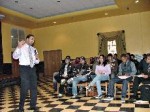
Dr. Angel Harris, assistant professor of sociology and African American Studies at Princeton University, presented a student research forum at his alma mater, Grambling State University. The forum was sponsored by GSU’s sociology and psychology department, NIMH-COR Honors program and Alpha Phi Alpha Fraternity, Inc.The forum was held Monday through Wednesday, and Harris said the main point of his presentation was “to show that the racial achievement gap is pervasive and persistent, and begins early in the schooling process.”
Also, Harris said that he returned to his alma mater to encourage students to apply to graduate schools across the country. To achieve this end, he held seminars geared towards showing students how to prepare portfolios for graduate school.
He spoke of the gaps between black and white students in subjects such as reading in math. Harris said that it would take six decades to close the gap in reading and a little over a century to close the gap in math. According to him, on average, blacks graduate from high school with the skill level whites had in the eight grade.
He spoke of proposed reasons for the gap: genetic deficiency, which started with Arthur Jensen; resource differentials and family structure, based on Douglas Massey and Nancy Denton’s research; bias in testing; and “bad” culture, explored by John Ogbu, which is the focus of Harris’ research.
Harris said that black students fall behind early in the school system, and one reason that blacks resist school is that they believe they will not receive the same rewards as whites. He said that models to control for when looking at the aforementioned are parental education, family income, family structure, and child’s sex. If the gap is to be closed, then black students need prior skills in subjects such as math and reading.
Harris’ GSU professors remember him as a bright and promising student. While a student at GSU, Harris enrolled in Dr. LaWanna Gunn-Williams’ Psychology and the Law course. She said that he was articulate and most inquisitive and his questions and remarks often stimulated scholarly thought and discussion.
A professor of psychology for 26 years at GSU, Gunn-Williams, said, “Dr. Harris was very personable and related well with the students. He gave valuable information concerning graduate work and was most encouraging. I am most proud of his academic and professional accomplishments.”
The students found Harris’ presentations enjoyable and useful. St. Lucia native and psychology major Emma Jules said that the lecture was impressive and explained the feasibility of social research and helped her to understand the importance of engaging in reading in order to excel.
She said, “The lecture enforced reality and also the stereotypes that one encounters, especially as a student of the minority race.” Jules said the lecture was definitely helpful because it reiterated the fact that excelling is possible, but one must be dedicated and committed.”
Harris said, “Returning as a professor to GSU gives me a greater appreciation for the mentorship and nurturance that these professors provide for students.”
“A great deal of credit should be given to Walter L. Davis and several students who worked very hard to put together a schedule that allowed me to meet numerous people at GSU,” said Harris. “I was honored that so many students and faculty attended the presentations. It made me proud to be a GSU alumnus.”
Davis, who has been a professor of sociology at GSU for almost 14 years, said that when Harris was a student he sensed that he was a unusually good student. “He had always dome the assigned reading and was fully prepared to engage in classroom discussions. He usually asked provocative questions and always remained after class ended to pursue lines of discussions begun in class and to ask for additional reading.”
Harris, a 1997 GSU graduate, said that he became interested in empiricism and how to answer questions while at GSU. He spoke of Dr. Ray Foster’s definition of behavior. He said Foster told him that you can say, “Your child is misbehaving” or “In the past hour your child has kicked three children and punched four.”
Harris defines himself as a social psychologist interested in educational issues. This is explained under his profile at Princeton: “Thus, my research focuses on the social psychological determinants of the racial achievement gap. I have focused on identifying factors that contribute to African Americans’ lower academic achievement and Asian Americans’ higher academic achievement relative to Whites.
